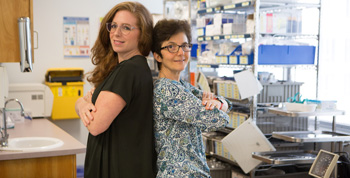Clinic for women with bleeding disorders follows women through life cycles

By Leslie Shepherd

Dr. Michelle Sholzberg, an adult hematologist, (left) and Dr. Filomena Meffe, an obstetrician/gynecologist, (right) are part of the all-female team that runs a clinic for women with bleeding disorders. (Photo by Katie Cooper)
Many people associate bleeding disorders with hemophilia, the rare and potentially fatal genetic disorder that affects men predominantly, including about 3,100 in Canada.
But the most common bleeding disorders are von Willebrand disease and inherited platelet disorders, affecting one to two per cent of the population, or 35,000 Canadians. The people most commonly affected by those two conditions are women.
Because woman have more opportunity to bleed than men – during their menstrual periods and around childbirth – and because these conditions can be difficult to diagnose, even for hematologists, St. Michael’s Hospital has established a Multidisciplinary Clinic for Women with Bleeding Disorders. It’s only the fourth clinic of its kind in Canada.
“We follow our patients through their life cycle,” said Dr. Michelle Sholzberg, an adult hematologist and medical director of St. Michael’s coagulation lab. “We are available for management of heavy menstrual bleeding, surgery, antenatal consultation, labour and delivery and postpartum care in the bleeding disorders population.”
The clinic, located in the Specialty Clinics on 4 Cardinal Carter, has registered about 200 patients and delivered more than 60 of their babies since opening in 2014. The entire team is female: Dr. Sholzberg, obstetrician/gynecologist Dr. Filomena Meffe, pediatric hematologist Dr. Jillian Baker, anesthesiologist Dr. Rachel Martin, case manager Georgina Floros and clinic administrator Antonette Travas. This clinic has been supported since its inception by Dr. Jerry Teitel, founder of the hemophilia treatment centre at St. Michael’s.
“It’s a one-stop-shop,” said Dr. Meffe. “Patients see us all in one clinic and it’s our team approach that makes a difference”
Dr. Sholzberg said bleeding disorders are vastly underdiagnosed and under-reported among women. Women with inherited bleeding disorders may believe their heavy periods are “normal” because that’s what their mothers, grandmothers and other female relatives experienced, she said.
“Your personal interpretation of your bleeding pattern is coloured by your family history and your own history of bleeding. If you have bled heavily since your menarche, that’s your benchmark.”
Heavy, chronic bleeding can cause iron deficiency and anemia, which can profoundly impact quality of life, she said. Iron deficiency lowers energy, mood, concentration, IQ, and can result in work/school absences. Women with inherited bleeding disorders are at increased risk of needing transfusions during childbirth and there is a higher risk of them or their babies dying.
“Our goal is to diminish unnecessary harm from heavy bleeding,” Dr. Sholzberg said. “We’re not going to cure them but we can help them manage so they can live healthy, productive lives.”
Dr. Sholzberg recently published a paper showing how questionnaires about bleeding can help health-care providers make better diagnoses and lead to better patient care. She said that since women with a family history of heavy bleeding may not recognize it as a health issue, practitioners have to ask.
About St. Michael’s Hospital
St. Michael’s Hospital provides compassionate care to all who enter its doors. The hospital also provides outstanding medical education to future health care professionals in more than 29 academic disciplines. Critical care and trauma, heart disease, neurosurgery, diabetes, cancer care, care of the homeless and global health are among the Hospital’s recognized areas of expertise. Through the Keenan Research Centre and the Li Ka Shing International Healthcare Education Centre, which make up the Li Ka Shing Knowledge Institute, research and education at St. Michael’s Hospital are recognized and make an impact around the world. Founded in 1892, the hospital is fully affiliated with the University of Toronto.
